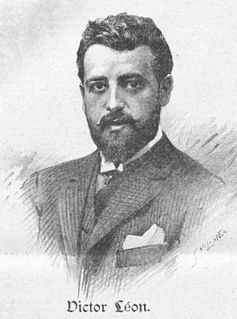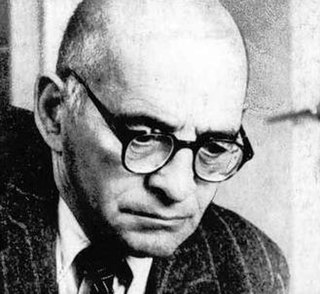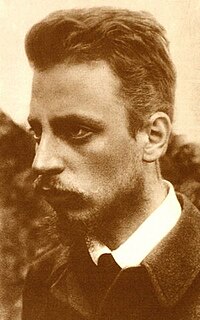 W
WAdolf Abrahamowicz was an Austro-Hungarian Armenian writer who wrote in the Polish language. He was a landowner, but lived of his life in Lviv. He worked with many directors and actors, especially with Ryszard Ruszkowski. His farce and slapstick was very popular in the Polish entertainment repertoire of the nineteenth century.
 W
WEndre Ady was a turn-of-the-century Hungarian poet and journalist. Regarded by many as the greatest Hungarian poet of the 20th century, he was noted for his steadfast belief in social progress and development and for his poetry's exploration of fundamental questions of the modern European experience: love, temporality, faith, individuality, and patriotism.
 W
WMuhammad Asad, Arabic: محمد أسد /mʊħʌmmʌd ʌsʌd/, Urdu: محمد أسد, born Leopold Weiss; 2 July 1900 – 20 February 1992) was an Austro-Hungarian-born Muslim journalist, traveler, writer, linguist, political theorist, diplomat and Islamic scholar. Asad was one of the most influential European Muslims of the 20th century. His translation of the Quran in English, "The Message of The Qur'an" is one of the most notable of his works. In Asad's words in "The Message of the Quran": "the work which I am now placing before the public is based on a lifetime of study and of many years spent in Arabia. It is an attempt - perhaps the first attempt - at a really idiomatic, explanatory rendition of the Qur'anic message into a European language."
 W
WLajos Bíró was a Hungarian novelist, playwright, and screenwriter who wrote many films from the early 1920s through the late 1940s. He was born in Nagyvárad, Austria-Hungary and eventually moved to the United Kingdom where he worked as a scenario chief for London Film Productions run by Alexander Korda, collaborating on many screenplays with Arthur Wimperis. He died in London on 9 September 1948 of a heart attack. He is buried in the northern section of Hampstead Cemetery in north London.
 W
WFerdinand Blumentritt was an Austrian teacher, secondary school principal in Leitmeritz, lecturer, and author of articles and books in the Philippines and its ethnography. He is well known in the Philippines for his close friendship with the writer and Propagandist José Rizal, and the numerous correspondence between the two provide a vital reference for Rizal historians and scholars, including his last letter from prison before the execution.
 W
WMax Brod was a German-speaking Jewish, later Israeli, author, composer, and journalist. Although he was a prolific writer in his own right, he is best remembered as the friend and biographer of writer Franz Kafka. Kafka named Brod as his literary executor, instructing Brod to burn his unpublished work upon his death. Brod refused and had Kafka's works published instead.
 W
WNicolae Densușianu was a Transylvanian, later Romanian ethnologist and collector of Romanian folklore. He was a corresponding member of the Romanian Academy, with a specialty in history. His main work, for which he is chiefly remembered, was the posthumously printed Dacia Preistorică (1913), with a preface contributed by C. I. Istrati; a facsimile edition was published in 2002 by Editura Arhetip, Bucharest. In Dacia Preistorică Densușianu combined the studies of folklore and comparative religion with archaeology to construct a theory about the Prehistoric cultures of Dacia. The work has drawn criticism for unprofessionalism and evidence of nationalism, and for standing at the source of Protochronism. Mainstream scholars regarded his book as fanciful and unscientific.
 W
WAdolf Fischhof was a Hungarian-Austrian writer and politician of Jewish descent.
 W
WLudwig August Ritter von Frankl-Hochwart was a Jewish Bohemian-Austrian writer and poet. He was a friend of Nikolaus Lenau. Also, he corresponded with Petar II Petrovic Njegos of Montenegro before he died in 1851. Frankl's Gusle, Serbische Nationallieder was dedicated to Vuk Karadžić's daughter in 1852. His object was to present some of the songs in Vuk which had not yet been translated, and he took the greatest pains to reproduce in German the metrical effect of the Serbian original.
 W
WIvan Yakovych Franko was a Ukrainian poet, writer, social and literary critic, journalist, interpreter, economist, political activist, doctor of philosophy, ethnographer, and the author of the first detective novels and modern poetry in the Ukrainian language.
 W
WKarl Emil Franzos was a popular Austrian novelist of the late 19th century. His works, both reportage and fiction, concentrate on the multi-ethnic corner of Galicia, Podolia and Bukovina, now largely in western Ukraine, where the Habsburg and Russian empires met. This area became so closely associated with his name that one critic called it "Franzos country". A number of his books were translated into English, and Gladstone is said to have been among his admirers.
 W
WNikola "Nikša" Gradi Italian: Nicolò Gradi; 1825–1894) was a writer, politician, and lawyer from Dubrovnik, a descendant of the illustrious Ragusan patrician family Gradi.
 W
WIon Grămadă was an Austro-Hungarian-born Romanian writer, historian and journalist. A native of Bukovina, he joined the Romanian Army and died in battle during World War I.
 W
WEdmund Josef von Horváth was a German-writing Austro-Hungarian-born playwright and novelist. He preferred the Hungarian version of his first name and published as Ödön von Horváth.
 W
WŞtefan Octavian Iosif was a Romanian poet and translator of Romanian origin.
Emil Isac was an Austro-Hungarian-born Romanian poet, dramatist, short story writer and critic. Noted as one of the pioneers of Symbolism and modernist literature in his native region of Transylvania, he was in tandem one of the leading young voices of the Symbolist movement in the neighboring Kingdom of Romania. Moving from prose poems with cosmopolitan traits, fusing Neo-romantic subjects with modernist free verse, he later created a lyrical discourse in the line of Social Realism. Isac was likewise known for criticizing traditionalist and nationalist trends in local literature, but, by the end of World War I, opened his own poetry to various traditionalist influences.
 W
WFranz Kafka was a German-speaking Bohemian novelist and short-story writer, widely regarded as one of the major figures of 20th-century literature. His work fuses elements of realism and the fantastic. It typically features isolated protagonists facing bizarre or surrealistic predicaments and incomprehensible socio-bureaucratic powers. It has been interpreted as exploring themes of alienation, existential anxiety, guilt, and absurdity. His best known works include "Die Verwandlung", Der Process, and Das Schloss. The term Kafkaesque has entered the English language to describe situations like those found in his writing.
 W
WAugust Kanitz was a Hungarian botanist.
 W
WAloisia Kirschner was an Austrian novelist, born in Prague and favorably known under her pseudonym Ossip Schubin, which she borrowed from the novel Helena by Ivan Turgenev.
 W
WLeopold Kompert was a Bohemian Jewish writer. He was born in Mnichovo Hradiště, Bohemia, and died in Vienna.
 W
WKarl Kraus was an Austrian writer and journalist, known as a satirist, essayist, aphorist, playwright and poet. He directed his satire at the press, German culture, and German and Austrian politics. He was nominated for the Nobel Prize in Literature three times.
 W
WAndreas Latzko was an Austro-Hungarian pacifist of Jewish origin, a novelist and biographer.
 W
WKarl Gottfried Ritter von Leitner was an Austrian author and publicist from Graz, Styria, Austria.
 W
WVictor Léon, also Viktor Léon was a well-known Jewish Austrian-Hungarian librettist. He collaborated with Leo Stein to produce the libretto of Franz Lehár's romantic operetta The Merry Widow.
 W
WRodion Markovits was an Austro-Hungarian-born writer, journalist and lawyer, one of the early modernist contributors to Magyar literary culture in Transylvania and Banat regions. He achieved international fame with the extended reportage Szibériai garnizon, which chronicles his own exotic experiences in World War I and the Russian Civil War. Locally, he is also known for his lifelong contribution to the political and cultural press of Transylvania. A Romanian national after 1920, Markovits divided himself between the Hungarian Romanian and Jewish communities, and was marginally affiliated with both the Ma art group and the Erdélyi Helikon writers.
 W
WAlois Musil was a Moravian theologian, orientalist, explorer and bilingual Czech and German writer.
 W
WMarie von Najmájer - was an Austrian novelist and poet. Daughter of a Hungarian royal hofrat Franz von Najmájer. In 1852 she moved to Vienna with her mother. She was an activist of the Association for Women's Education in Vienna.
 W
WIvan Grigorievitch Naumovich (Polish: Iwan Naumowicz, Russian: Ива́н Григо́рьевич Наумо́вич, Ukrainian: Іва́н Григо́рович Нау́мович;, was a priest, member of parliament, writer, and major figure in the Russophile movement in western Ukraine. His article Glimpse into the future was considered the most important manifesto of Galician Russophilism
 W
WDr. Joseph Oleskiw or Jósef Olesków was a Ukrainian professor of agronomy who promoted Ukrainian immigration to the Canadian prairies. His efforts helped encourage the initial wave of settlers which began the Ukrainian Canadian community.
 W
WLeopold Perutz was an Austrian novelist and mathematician. He was born in Prague and was thus a citizen of the Austro-Hungarian Empire. He lived in Vienna until the Nazi Anschluss in 1938, when he emigrated to Palestine.
 W
WRené Karl Wilhelm Johann Josef Maria Rilke, better known as Rainer Maria Rilke, was a Bohemian-Austrian poet and novelist. He is "widely recognized as one of the most lyrically intense German-language poets". He wrote both verse and highly lyrical prose. Several critics have described Rilke's work as "mystical". His writings include one novel, several collections of poetry and several volumes of correspondence in which he invokes images that focus on the difficulty of communion with the ineffable in an age of disbelief, solitude and anxiety. These themes position him as a transitional figure between traditional and modernist writers.
 W
WJoseph Roth, born Moses Joseph Roth, was an Austrian journalist and novelist, best known for his family saga Radetzky March (1932), about the decline and fall of the Austro-Hungarian Empire, his novel of Jewish life, Job (1930), and his seminal essay "Juden auf Wanderschaft", a fragmented account of the Jewish migrations from eastern to western Europe in the aftermath of World War I and the Russian Revolution. In the 21st century, publications in English of Radetzky March and of collections of his journalism from Berlin and Paris created a revival of interest in Roth.
 W
WLeopold Ritter von Sacher-Masoch was an Austrian nobleman, writer and journalist, who gained renown for his romantic stories of Galician life. The term masochism is derived from his name, invented by his contemporary, the Austrian psychiatrist Richard von Krafft-Ebing. Masoch did not approve of this use of his name.
 W
WFelix Salten was an Austro-Hungarian author and literary critic in Vienna. His most famous work is Bambi, a Life in the Woods (1923).
 W
WIgnaz Schnitzer was an Austrian writer, journalist, translator, librettist and newspaper founder of Hungarian origin.
 W
WAugust Karl Silberstein was an Austrian writer, born in Ofen, Budapest (Hungary). Silberstein was educated at the University of Vienna and supported the 1848 revolts in Austria-Hungary with his articles in the German satire periodical Leuchtkugeln, which was banned in the middle of 1851. As a result, Silberstein was forced to leave his home.
 W
WBertha Felicitas Sophie Freifrau von Suttner was an Austrian-Bohemian pacifist and novelist. In 1905, she became the second female Nobel laureate, the first woman to be awarded the Nobel Peace Prize, and the first Austrian laureate.
 W
WJagoda Truhelka was a Yugoslav writer and pedagogist. A native of Slavonia, Truhelka worked as teacher and headmistress in Osijek, Zagreb, Gospić, Banja Luka, and Sarajevo. Her novels are notable for focusing on female characters and discussing women's rights, but Truhelka is best known for her children's literature.
 W
WFranz Viktor Werfel was an Austrian-Bohemian novelist, playwright, and poet whose career spanned World War I, the Interwar period, and World War II. He is primarily known as the author of The Forty Days of Musa Dagh, a novel based on events that took place during the Armenian Genocide of 1915, and The Song of Bernadette (1941), a novel about the life and visions of the French Catholic saint Bernadette Soubirous, which was made into a Hollywood film of the same name.
 W
WStefan Zweig was an Austrian novelist, playwright, journalist and biographer. At the height of his literary career, in the 1920s and 1930s, he was one of the most widely translated and most popular writers in the world.